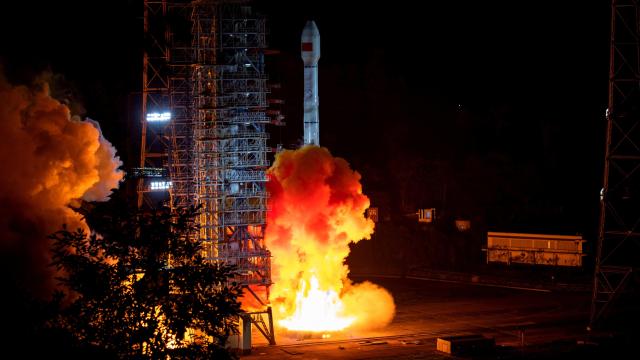In an effort to prevent falling rockets from landing on populated areas, China tested a parachute system designed to control where its rocket boosters land back on Earth.
China successfully carried out the first test of its parachute system during a recent launch of its Long March 3B rocket, the China Academy of Launch Vehicle Technology announced on Friday. The rocket delivered a BeiDou navigation satellite to orbit, lifting off from the Xichang Satellite Launch Centre in Sichuan Province on May 17, China’s state media Xinhua reported.
The news, which was delivered nearly a month after the test, doesn’t specify where the rocket booster landed. Instead, Xinhua stated that the rocket booster was brought down by the parachute to a “predetermined location,” and that the parachute narrowed the landing area by 80%.
Based on previous reports, the parachute system is designed to significantly narrow down the landing area for some of China’s Long March rocket boosters from 90 kilometres to 30 kilometres. The system uses a parachute and a gliding control system installed on the side boosters of China’s Long March 3B, 3C and 2F rockets.
The rocket boosters don’t make it all the way to space, instead reaching an altitude of 50 kilometres above the surface, Jonathan McDowell, an astronomer at the Harvard-Smithsonian Centre for Astrophysics, told Gizmodo during an interview in March.
By bringing the boosters down gently, China also has a better chance of reusing them for future launches. “We’ll also make the landing area into a landing bed by adding cushion, making it soft as a mattress,” Teng Haishan, deputy chief engineer of the No. 508 Institute of China Academy of Space Technology (CAST), told CCTV in March. “As a result, the booster will be completely recyclable without any damage.”
China has a history of its rockets falling uncontrollably towards Earth, specifically its Long March 5B rocket (which weighs a whopping 21.6 metric tons). Two years ago, debris from the inaugural launch of the rocket fell onto the Ivory Coast, causing damage to people’s property. For the rocket’s second flight, the booster fell into the Indian Ocean away from populated areas while on its third flight in July 2022, pieces of the rocket came crashing down onto parts of Indonesia and Philippines.
Most recently, a Long March 5B core stage fell uncontrollably towards Earth in November 2022, breaking up over the eastern Pacific Ocean, with debris falling to the southwest of the Mexican coast. During its unpredictable descent, Spain was forced to shut down its airspace.
The parachute system would not be used on the Long March 5B as the larger rocket would require a more intricate system to safely land it within a predetermined area, namely an engine burn to steer it towards a designated spot away from populated regions.
As the space industry continues to grow, the more rockets that go up, the more they need to come down safely so as not to threaten the safety of people below.
